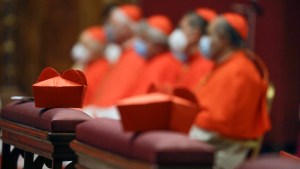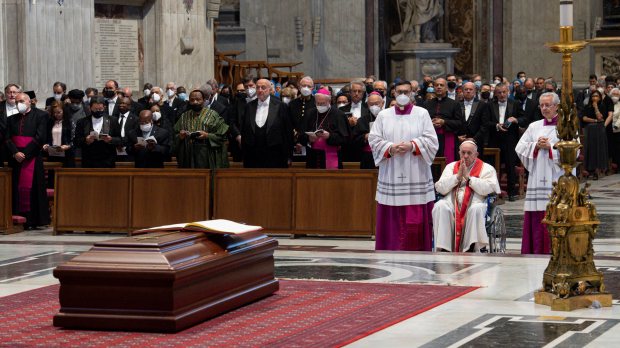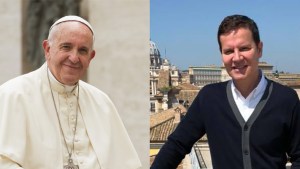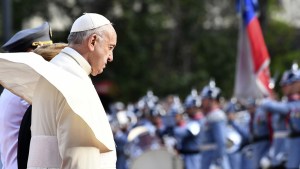Four days after his death at the age of 94, the funeral of the former Secretary of State of John Paul II and Benedict XVI, a central figure in the government of the Church for three decades, took place on May 31, 2022 at St. Peter’s Basilica. Pope Francis was present in the front row, in a wheelchair, and 36 cardinals and about 40 bishops concelebrated the Mass, which was not broadcast by Vatican Media.
The ceremony was presided over by Cardinal Giovanni Battista Re, current Dean of the Sacred College, who has succeeded Cardinal Sodano in that office in 2019. The two men knew each other well: Cardinal Re was in fact the substitute of the Secretariat of State from 1989 to 2000 and therefore worked closely with Cardinal Sodano, Secretary of State from 1990 to 2006, during the last decade of the 20th century.
In his homily, he recalled Cardinal Sodano’s long career, which included “71 years of priesthood and 60 years of service to the Holy See.” Ordained in 1950, he first taught dogmatic theology in his native Piedmontese diocese of Asti, then served as a chaplain to students before entering the diplomatic service of the Holy See in 1961.
Early diplomatic service
Cardinal Sodano’s first assignments were dedicated to nonciatures in Latin America, first in Ecuador and then in Uruguay and Chile. “It was an interesting experience, but also a challenge for him, because it was the years of the Second Vatican Council and the immediate post-conciliar period,” explained Cardinal Re, referring to the deep divisions among the Catholic clergy of that continent in those tormented years. Some priests and religious close to liberation theology were committed to armed conflicts, while others considered military dictatorships a lesser evil to counter the risk of expansion of communism.
Between 1968 and 1977, he came face to face with this ideology: Archbishop Sodano returned to the Vatican and accompanied the Holy See‘s Ostpolitik, under the leadership of Archbishop Casaroli, within the Council for Public Affairs of the Church, which was the equivalent of a foreign ministry. With Europe “then divided into two blocs,” Cardinal Re recalled, Archbishop Sodano visited Romania, Hungary and East Germany.
Nuncio to Chile
In 1977, Paul VI appointed him Apostolic Nuncio to Chile, where he had worked a decade earlier. “The country was not unfamiliar to him, but the situation he found was different from the one he had known when he was secretary of the apostolic nunciature, because it was a ‘hot’ period due to the conflict between Chile and Argentina over the territory of the Beagle Channel,” recalled Cardinal Re.
“One of his first tasks was to collaborate in the mediation initiative that Pope John Paul II had entrusted to Cardinal Antonio Samoré, with whom Archbishop Sodano collaborated with great commitment,” stressed the Dean of the Sacred College, praising the success of this mediation, which helped avoid a war between the two Catholic countries.
“These years have been difficult for Chile, especially because of the dictatorship of General Pinochet,” he said. The mention of this difficult political context, unusual in a homily, can be seen as a response to the many critical voices that have reproached Cardinal Sodano for his closeness to the Chilean dictator.
The main collaborator of John Paul II at the turn of the century
Regarding Cardinal Sodano’s work as Secretary for Relations with States from 1988 and then as Secretary of State from 1990 under John Paul II and Benedict XVI, Cardinal Re recalled the tormented geopolitical context of that turn-of-the-century period.
“During the almost 16 years that he was the Pope’s primary collaborator, he worked for peace with competence and dedication,” Cardinal Re insisted. The Dean of the Sacred College recalled “the complexity of geopolitical situations: we need only think of the end of the Cold War, the conflict in the Persian Gulf, the war in Iraq, the conflicts in the Balkans, the tragic September 11, 2001 in New York and the subsequent development of terrorism in the world,” he recalled.
He praised “Cardinal Sodano’s high sense of duty, his intellectual gifts and heart, his sensitivity to the pastoral objectives of the Church’s action in the world, his wisdom in evaluating events and situations, and his availability to help, seeking appropriate solutions in each case.”
Cardinal Re also recalled that Cardinal Sodano had held the “role of Dean of the College of Cardinals until the end of 2019, when, with declining strength, he gave up this function, devoting himself more and more to prayer.”
The withdrawal of Cardinal Sodano, although not yet an old man, was attributed more to the investigation into his responsibility in the sexual abuse cases in Chile than to his health. His role in protecting the founder of the Legionaries of Christ, Marcial Maciel, and the former Archbishop of Washington, ex-Cardinal Theodore McCarrick, also tarnished Cardinal Sodano’s image considerably. No mention was made of these cases during the ceremony.
Pope Francis, who is in a wheelchair, pronounced the Final Commendation in Latin, with no further words.
Unlike other funeral ceremonies, such as for Cardinal Tauran in July 2018, the Holy See’s communications services did not broadcast the Mass. This choice seems linked to a desire for discretion related to the controversies surrounding this former “Prime Minister” of two popes, who had remained a keystone of the papal institution and had kept a strong influence until the first years of Pope Francis’ pontificate.




